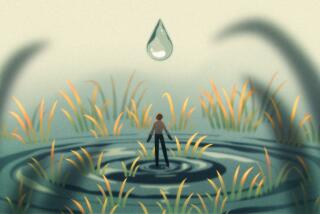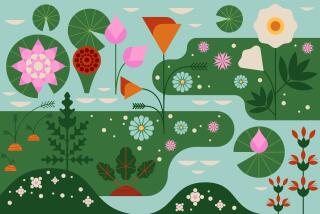GARDENING : A Mulch More Efficient Method
- Share via
Mulch has been an important ingredient in any well-planned landscape, and now in the midst of a five-year drought, it’s more crucial than ever for Californians.
You don’t have to be an avid gardener to benefit from the addition of mulch to your garden. The simple act of placing a 2- to 4-inch layer of mulch on your soil automatically reduces landscape water consumption by 10% to 15%, practically eliminates laborious weedingand saves on fertilizer costs.
What is mulch? Horticulturists define it as a protective covering over the soil resulting in cooler soil with better water retention than if it were exposed to the hot sun and drying winds.
There are many effective materials that can be used as mulch. These include such simple additions as grass clippings, leaves, sawdust, bark, rocks and gravel, compost and even layers of old newspapers.
However, since the microbial breakdown of some of these substances can rob the soil of precious nitrogen, it’s better to use as a mulch a product that’s already been broken down by the composting process.
“Mulching creates a biological sponge where the soil can better absorb water,” explained Bill Roley, a former professor at Saddleback College and the founder of Sprout Acres, a demonstration house and garden in Laguna Beach.
Another important benefit of mulching is that it improves the quality of the soil as the mulch components are broken down by soil microorganisms.
“Mulching is actually cold composting,” Roley said. “The material is broken down much more slowly than if it were composted, but the end result is the same--a natural soil regenerative system.”
Chuck Rathfon, a landscape designer with Roger’s Gardens Landscape in Corona del Mar, advocates mulch for all landscape situations for aesthetics as well as water conservation.
“We encourage people to broaden their perspectives and use mulch in ways they wouldn’t normally, such as in open play areas in a yard or as a substitute for lawn under trees,” he said.
“Shredded bark works well as a ground cover in a planted landscape because it evokes the mood of a natural wooded environment,” he added.
Mulch also could help alleviate another problem facing cities across the nation--landfill shortages. Garden debris accounts for approximately 20% of all refuse, and composting is fast becoming a partial solution to this problem.
“Recycling green waste and turning it into compost is catching on all across America,” said John Roulac, president of Harmonious Technologies in Pasadena and a compost consultant to cities throughout the nation.
“The future trend is that homeowners will be mandated to compost all their yard and kitchen waste,” Roulac said.
Many commercial soil companies are already turning to recycling green wastes as ingredients in their products.
Rogers Gardens offers a mulch based on recycled yard waste obtained from its landscaping projects.
“Instead of discarding the trees, shrubs, plants and other plantings we remove during a yard renovation, we now grind the materials up, compost them, and reuse this as mulch material,” Rathfon said.
Aguinaga Fertilizer Co. in Irvine also sells green-waste mulch. Finely shredded branches, leaves and tree trimmings are composted, and the end result is a medium-brown material that works well as a ground cover mulch and a soil amendment.
Founded in 1947, and still owned and operated by the Aguinaga family, the firm specializes in organic soil amendments and fertilizers.
“We carry a variety of mulches, and all are good depending on the type of plants in the landscape, the type of soil--sand, clay, loam, or a mixture--and if it’s acid or alkaline,” said Roger Aguinaga.
“We find out from the homeowner what the needs of that particular landscape are before we recommend a specific mulch,” he added.
It’s important to add fertilizer to the garden to prevent a nitrogen deficiency, according to Aguinaga.
“We advocate organics as much as possible, but we still believe there’s value in adding a little commercial fertilizer because one enhances the other,” he said.
Many gardeners like to scatter an all-purpose granular fertilizer on the soil, work it in lightly, then apply mulch as the protective cover.
Various types of bark covers serve as attractive mulch materials and provide a good walking surface in a garden. Roger’s Landscape offers shredded bark, and Cal Blend Soil and Amendments in the City of Industry offers fir bark in addition to shredded redwood. The fir bark is smaller than redwood chips and is a lightweight mulch that is very easy to apply. It breaks down very gradually and has very good water-retention.
“We feel fir bark is the best material available for a mulch because it does everything that the other mulches do and is so easy to spread,” said Mike McCain, owner of Cal Blends Soil and Amendments. “A cubic yard of composted mulch material weighs 500 pounds; a cubic yard of fir bark weighs 400 pounds.”
A simple formula will help you know how much mulch your garden requires. Determine the square footage of the total garden and multiply that by the depth of mulch required. (Rathfon recommends a 2-inch layer of mulch for established plants and 3 inches for younger plantings.) Divide that figure by 324 to calculate the total cubic yards required. For example, a 1,000-square-foot garden mulched at a depth of 3 inches will require 10 cubic yards of mulch.
The most cost-effective way to purchase mulch is by bulk. Prices range from $12 to $30 a cubic yard, depending on the type of mulch. Most companies also charge a delivery fee.
Bagged mulch is available at nursery and home improvement stores for about $6 or $7 for a 2-cubic-foot bag.
SOURCES FOR MULCH:
Aguinaga Fertilizer Co.
7992 Irvine Blvd.
Irvine, Calif., 92710
(714) 786-9558
Cal Blend Soils and Amendments
P.O. Box 3048
City of Industry, Calif., 91744
(213) 695-4537
Roger’s Garden Landscape
2301 San Joaquin Road
Corona del Mar, Calif., 92625
(714) 640-5806






